| Srl | Item |
| 1 |
ID:
127395
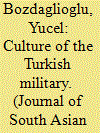

|
|
|
| 2 |
ID:
154239
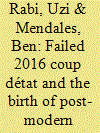

|
|
|
| 3 |
ID:
159338


|
|
|
|
|
| Summary/Abstract |
This article examines the Turkish National Security Council's (NSC's) constitutional status within the executive organ of the state. It surveys security councils of 31 countries to demonstrate the peculiarity of the NSC's status. It explores how the constitutional articles on the NSC were developed in the making of the 1961 and 1982 Turkish Constitutions. It examines the discussions in constituent assemblies, draft constitutions and reasoned reports of constitutional commissions in order to ascertain the motives behind the establishment of this tutelary council. The paper also offers insights into the importance and meaning of reforms that the NSC has undergone since 2001.
|
|
|
|
|
|
|
|
|
|
|
|
|
|
|
|
| 4 |
ID:
177009


|
|
|
|
|
| Summary/Abstract |
With four successful and three failed coups in less than 60 years, the Turkish military is one of the most interventionist armed forces in the global south. Despite this record, few scholars have analyzed systematically how the military’s political role changed over time. To address this gap, this article examines the evolution of civil–military relations (CMR) in Turkey throughout the 1960s and 1970s. Based on a historical analysis, this article offers a revisionist account for the extant Turkish scholarship and also contributes to the broader literature on CMR. It argues that the military’s guardian status was not clearly defined and that the officer corps differed strongly on major political issues throughout the Cold War. This article also demonstrates that the officer corps was divided into opposite ideological factions and political agendas and enjoyed varying levels of political influence due to frequent purges and conjectural changes.
|
|
|
|
|
|
|
|
|
|
|
|
|
|
|
|
| 5 |
ID:
138759
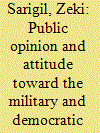

|
|
|
|
|
| Summary/Abstract |
The political influence of the Turkish military has substantially declined in the last decade, triggered by the European Union’s decision during the Helsinki Summit in 1999 to grant candidacy status to Turkey. This study illuminates Turkey’s democratization process in the post-Helsinki period by empirically analyzing a relatively underinvestigated aspect of civil–military relations: public opinion and attitude toward the military and civil–military issues. Empirical analyses, based on original and comprehensive public opinion data, indicate that despite impressive reforms and improvements in the legal and institutional structures in Turkish civil–military relations in the past ten years, democratic transformation in the political culture has been lagging behind. This gap is likely to complicate democratization process in Turkey. The article also provides a discussion of broader theoretical and practical implications of empirical findings.
|
|
|
|
|
|
|
|
|
|
|
|
|
|
|
|
| 6 |
ID:
149698


|
|
|
|
|
| Summary/Abstract |
The Turkish government has responded to a failed coup by initiating a crackdown on its perceived opponents in the military, government, and wider society. Kerry Herschelmann assesses the outlook for Turkey's internal dynamics and its regional positioning.
|
|
|
|
|
|
|
|
|
|
|
|
|
|
|
|
| 7 |
ID:
160452
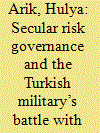

|
|
|
|
|
| Summary/Abstract |
Prior to its currently subservient position to civilian politics, the Turkish military had always had an autonomous position with a strong ideological commitment to safeguard secularism. From the 1980s to the end of the 2000s, the Turkish military played a key role in the construction of political Islam as a form of risk and in the securitization of religion both in the public sphere and within its own structure. This article examines the Turkish military’s security discourse around religion and the Islamic headscarf through the experiences of women in military families, and is based on ethnographic fieldwork conducted in 2011. Looking at headscarf regulations and the everyday life on military bases, it explores how the military governed Islamism as a form of risk in culturally and sexually specific ways. Drawing on critical security studies that approach risk as a form of social governance, the article examines secular risk governance through the lived experiences of women in military families, the regulation of their daily conduct, and the representation of their bodies and sexual identities through dress. Concluding remarks examine the significance of secular risk governance in the post-2010 era.
|
|
|
|
|
|
|
|
|
|
|
|
|
|
|
|
| 8 |
ID:
066184


|
|
|
| 9 |
ID:
158101
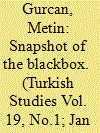

|
|
|
|
|
| Summary/Abstract |
This paper aims at opening the blackbox of the Turkish military by presenting the findings of a survey conducted among 1401 officers in May–August 2015. The findings, which could be defined as the snapshot of the Turkish military’s officer corps views, show that, as the ranks decrease, there are some major trends influencing the officer corps. These include heterogenization and diversification of opinions from collectivist to an individualist understanding of life, from an elitist to an egalitarian view of society, and change from value-centric service to a focus on financial goals and career opportunities. The findings also indicate that the Turkish Army, Air Force and Navy’s organizational cultures are dissimilar regarding their stance towards military transformation, organizational restructuring and some socio-political issues such as the extent of secularist sentiment, religiosity and political orientations.
|
|
|
|
|
|
|
|
|
|
|
|
|
|
|
|
| 10 |
ID:
127815


|
|
|
|
|
| Publication |
2014.
|
| Summary/Abstract |
One of the defining features of Turkish politics has been the strong influence of the military in civilian politics. However, since the early 2000s, we have seen unprecedented developments, substantially constraining the political powers of the military. How can we interpret this period from a historical perspective? What are the continuities and discontinuities in Turkish civil-military relations? Do these developments mark the end of military guardianship in the country? Employing the principal-agent framework, this study shows that the path of Turkish civil-military relations has been cyclical, where the status of the military has swung between agent and principal. Such swings have led to a significant degree of variance in the nature of the military guardianship. Thus, this study identifies two distinct stages of military tutelage during the Republican period: symbolic (1924-1960) and overt/assertive (1960-2001). It is further argued that the recent reversion of the military back to agent of the civilian principals has initiated a post-guardianship era in Turkey.
|
|
|
|
|
|
|
|
|
|
|
|
|
|
|
|
| 11 |
ID:
148613
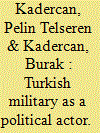

|
|
|